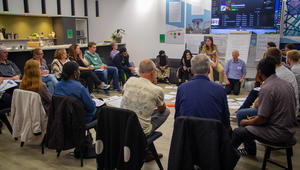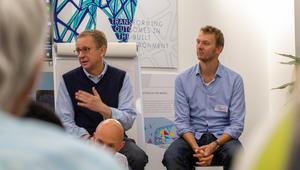The following is a summary of the structure of the Citizens’ Jury, which is being conducted throughout September-early November 2019 in central Leeds across weekly sessions lasting two-and-a-half hours each. As the process progresses we will upload video footage of the commentator presentations. To preserve the anonymity of participants this footage will not include images of jury members.
Session 1(12 September): Introduction
In the first session, participants spent time getting to know each other (through a "human bingo" ice-breaker) and meeting the facilitators from Shared Future (Pete Bryant and Jenny Willis).
Kate Lock, the Communications and Policy Officer from the Leeds Climate Commission, explained what the Commission is and why it had set up the Citizens' Jury, and answered questions from members of the jury.
The participants then took part in their first introductory practical activities aimed at encouraging deliberation and investigation, followed by mapping. Jury members worked in small groups each with a large map of different parts of the Leeds city region. Each group used a map to identify (with Post-It notes), ‘What is helpful in trying to tackle climate change?’ (green Post-It notes) and ‘What is not helpful in trying to tackle climate change?’ (red Post-It notes). The groups then shared and discussed their findings.
Finally, a problem tree activity allowed participants to start discussing the root causes of the challenge. The statement, ‘Climate Change has become an emergency’ was written on the trunk of a large tree drawn on flip charts stuck on the wall. Participants in small groups were invited to share why this problem has happened and to record their thoughts on Post-It notes that were then stuck on the roots of the tree. The facilitator continually pushed to answer ‘Why is this?’ in order to identify some of the root causes. The groups then shared and discussed their findings.
Session 2 (19 September): Visioning and an introduction to climate change
The second session started with participants working in pairs and small groups on a visioning activity to answer the questions ‘What are your visions for the Leeds region for 30 years' time? What kind of place do you want to live in? What will our neighbourhoods and communities look like and feel like?’ Facilitators invited participants to talk through their thoughts and to draw or list them. Some chose to do a closed-eye reflection activity. This was an attempt to start getting people to think about a future vision irrespective of climate change, the intention being to refer back to these visions as the group decides upon its recommendations.
Session two saw members of the jury experience their first interaction with external ‘commentators’. These outside experts offer their opinions and knowledge to the jury usually through the format of a 15-minute presentation followed by small group discussion (without the commentator) and a question-and-answer session (with the option for questions to be asked anonymously). The commentators are selected by the Oversight Panel. (Find out more about who they are and their role on the FAQs page).
Commentators: An introduction to climate change: Dr. Cat Scott (University of Leeds) and Professor Julia Steinberger (University of Leeds). What is climate change? (a basic introduction to the science). What are and will be the impacts of climate change? Why is the Earth warming? (an explanation of greenhouse gases and their emission sources). How much has it warmed and is it likely to warm in the future? What are the impacts of this warming? Inequalities in contributions to warming to date. What must society to do address the problem?
Watch the video of Cat and Julia's presentation.
Session 3 (26 September): The contribution of Leeds to climate change
The Oversight Panel agreed that in addition to hearing from a range of commentators, jury members should also be exposed to information through other formats including a video of the words of Greta Thunberg. Under the theme of ‘an introduction to climate change’, the group watched and then reflected on the video before hearing from the next commentators.
Commentators: The contribution of Leeds to climate change: Professor Paul Chatterton (University of Leeds and Our Future Leeds) and Professor Andy Gouldson (Leeds Climate Commission and University of Leeds).
Watch the video of Paul and Andy's presentation
Session 4 (3 October): How do we effect change, an international perspective - and what next?
Having discussed the context of Leeds, this week members started to explore how change could be achieved.
Commentators: How do we effect change? Andrew Simms (New Weather Institute; Rapid Transition Alliance). An introduction to how change can be achieved, the different aspects of change (techno, organisational, cultural), obstacles and challenges to change, the role of power and the tools that can be used to reduce emissions (e.g. incentives, bans, spending, engagement, education, nudge).
Commentators: An international perspective: Penny Wangari Jones and Sai Murray (Racial Justice Network). How is climate change currently affecting people in other countries and what will happen in the future? Internationalising the climate crisis. A social justice issue. The need to look beyond Leeds borders and at who the climate crisis is affecting most at present & how that is interconnected with social justice.
Between sessions jury members were asked to reflect upon what themes they would like to explore in more depth in sessions 5-7. This information was collated by the facilitators and fed back to the group at the start of session 4. The jury discussed the themes and reached consensus that Transport and Communication/Community Involvement should be a focus. They asked the Oversight Panel to offer them some advice on whether to choose Housing, Energy (generation and consumption) or Waste and ‘stuff’ as their third theme. This was considered by the Oversight panel at their meeting on Friday October 4th.
In addition, members of the jury requested that future commentators should consider:
- ‘What can the individual do? What can governments do? What can business do?
- What could motivate government/individuals/business to take action and what are the barriers?
- Giving examples, costs, and to explain how much this would contribute to reducing carbon as well as explaining other impacts, for example jobs.
Watch the video of the presentations by Andrew Simms and by Penny Wangari Jones and Sai Murray.
Session 5 (10 October): Transport
Session 5 saw participants exploring Transport, the first of the themes that they have prioritised for deliberation.
Commentators: Paul Foster (Leeds City Council, Transport Projects Manager), Mark Goldstone: Head of Policy and Representation: W and N Yorkshire Chamber of Commerce, Millie Duncan: Leeds Climate Commission (on the airport).
Watch short video interviews about their presentations by Millie Duncan, Mark Goldstone and Paul Foster. [NB: these are not the presentations to the jurors, but brief interviews conducted afterwards.]
Session 6 (17 October): Housing (with an emphasis on energy use and generation)
The following are areas that the jurors have indicated they would like to hear about and discuss in this session:
-
Housing (insulation and more energy efficient for all).
-
Energy efficiency in homes.
-
Housing – what does an eco-friendly housing environment look like? Solar panels, collection of rainwater for other uses etc.
-
Energy-efficient housing – using solar panels and good insulation.
-
Insulation and efficiency upgrades for houses. What would be most effective and how can they be funded?
-
Building stock.
-
Home energy efficiency improvements
Commentators: Neil Evans: Leeds City Council, Director of Resources and Housing; Steve Batty Engie. Head of Sustainability Places & Communities UK & Ireland; Andy Walker Sure Insulation (retro fitting); Steve Rowley: (Landlords): Leeds Property Association (LPA); Cindy Readman: (Save our homes LS26) (Residents/homeowners).
Watch short video interviews about their presentations by Steve Rowley, Cindy Readman, Andy Walker, Steve Batty and Neil Evans. [NB: these are not the presentations to the jurors, but brief interviews conducted afterwards.]
Session 7 (24 October): Communication and Community Involvement
During this session participants are interested in exploring in more depth a range of topics including ‘raising community awareness of the whole issue’, ‘getting the message out to the people of Leeds’, ‘behaviour change’ and ‘simplifying the message’.
Commentators: Jamie Clarke: Executive Director: Climate Outreach; Rob Greenland: Social Business Brokers CIC; Lydia Dibben: Extinction Rebellion Leeds; Julian Pearce: Senior Consultant, Social Communications; Alexis Percival: Member of Leeds Climate Commission, trustee of Roundhay Environment Action Project
Session 8 (31 October): Theme 1: Leeds City Council. Theme 2: models of finance.
Commentators: Councillor Lisa Mulherin: Executive Board Member for Climate Change, Transport and Sustainable Development, Leeds City Council; commentators for theme 2 tbc.
Session 9: (3 November): Recommendation writing
Participants will work together to draft and, if possible, build consensus around a set of recommendations written in their own words.






